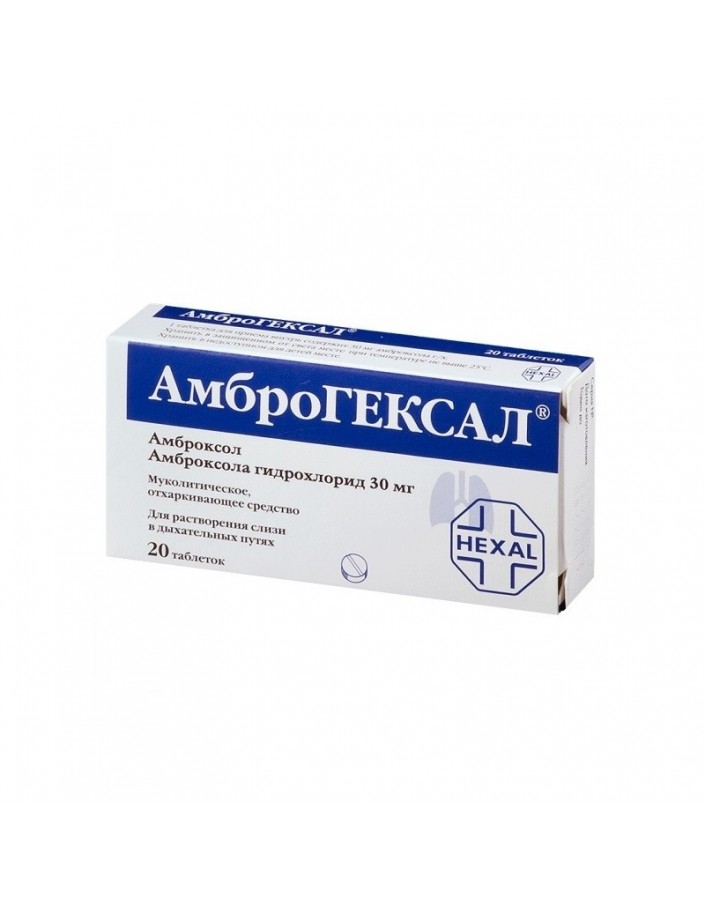




Security policy (edit with Customer reassurance module)

Delivery policy (edit with Customer reassurance module)

Return policy (edit with Customer reassurance module)
20 pcs.
The drug AmbroHEXAL has an expectorant, mucolytic action. A decrease in sputum viscosity occurs as a result of the depolymerization of mucopolysaccharides, which are in the sputum. The depolymerization of mucopolysaccharides is primarily associated with the disruption of disulfide bonds in their molecules. Ambroxol increases the motor activity of the ciliated epithelium, increases mucociliary transport, and normalizes the ratio of serous and mucous components of sputum. Activating hydrolyzing enzymes and enhancing the release of lysosomes from Clark cells, reduces the viscosity of sputum. Facilitates the excretion of sputum from the respiratory tract. Ambroxol stimulates prenatal lung development by increasing the synthesis and secretion of surfactant in the alveoli. Synthesis of surfactant decreases as a result of chronic diseases of the respiratory system, in addition, the properties of surfactant change due to the formation of bonds between surface-active phospholipids and inflammatory proteins.
Acute and chronic diseases of the respiratory tract with the discharge of viscous sputum: acute and chronic bronchitis, chronic obstructive pulmonary disease, pneumonia, bronchial asthma with obstructed sputum discharge, bronchiectasis.
Adequate and strictly controlled clinical studies on the safety of Ambrohexal use during pregnancy and lactation have not been conducted.
Therefore, the purpose of the drug (especially in the first trimester of pregnancy) is possible only in cases where the expected benefit of therapy for the mother outweighs the potential risk to the fetus or infant.
Adults and children over the age of 12 in the first 2-3 days of therapy, it is recommended to take 30 mg (1 tab.) 3 times / day, then 30 mg 2 times / day.
Children aged 6 to 12 years appoint 15 mg (1/2 tab.) 2-3 times / day.
Gastrointestinal: rarely - abdominal pain, nausea and constipation, dry mouth, increased salivation.
Respiratory: rarely - increased secretion of mucus in the nasal cavity, dry airways.
Allergic reactions: rarely, swelling, skin rashes, redness, itching, asphyxiation, swelling of the face, fever and chills; in some cases - allergic dermatitis; in rare cases - anaphylactic shock.
Other: rarely - difficulty urinating.
Ambrohexal should be prescribed with particular caution to patients with impaired renal function or with severe impaired liver function, in diseases associated with increased accumulation of bronchial secretions (for example, malignant ciliated syndrome). In such cases, taking Ambrohexal requires the supervision of a physician.
The patient should inform the doctor about the development of side effects.
At the first signs of the development of allergic reactions should stop taking the drug.
In the case of skipping the next dose at the subsequent reception should not exceed the dose.
Instructions for diabetics
1 pill corresponds to 0.01 XE.
Simultaneous use of Ambrohexal and antibacterial agents (amoxicillin, cefuroxime, Doxycycline, erythromycin) helps to improve the penetration of antibiotics into the respiratory tract. Most often Ambrohexal is used in combination with doxycycline.
With the simultaneous appointment of Ambrohexal with antitussives in connection with the suppression of the cough reflex, a dangerous stagnation of the secret secreted by Ambrohexal is possible (control of the doctor is required).
To date, there is no data on the interaction of Ambrohexal with other drugs used as basic therapy for bronchial asthma (bronchodilators, methylxanthine derivatives, corticosteroids).
Symptoms: there are reports of short-term anxiety and diarrhea. With a strong overdose, acute hypotension, vomiting, increased salivation are possible.
Treatment: drug withdrawal. Gastric lavage is indicated only for extreme overdose. If necessary, symptomatic therapy.
The drug should be stored at a temperature not higher than 25 ° C.